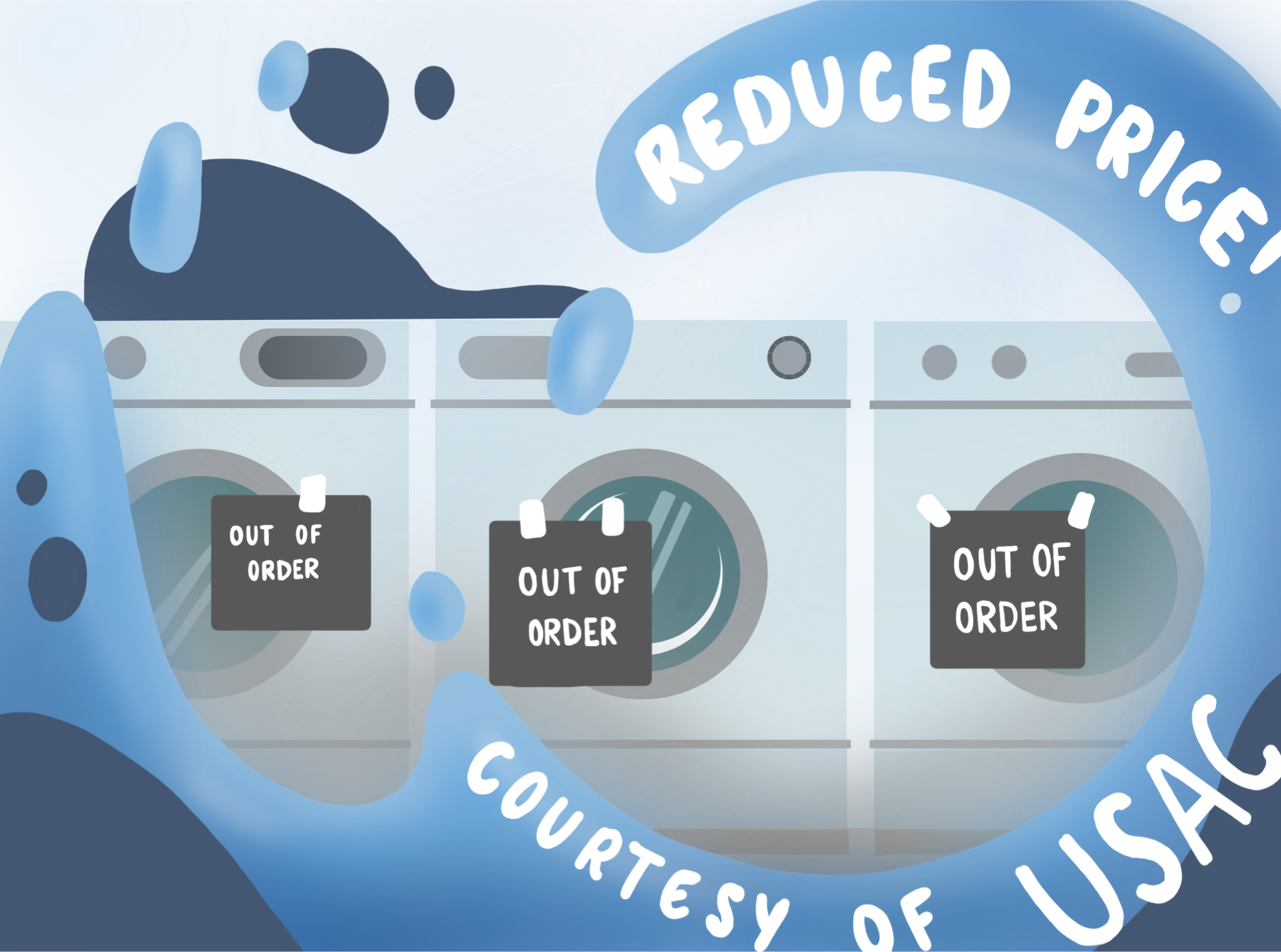USAC campaign to reduce laundry prices a good first step to earning voter trust

(Nitya Tak/Daily Bruin)
By Elizabeth Hanczor
Feb. 28, 2020 12:47 a.m.
Despite the constant turmoil, questionable accountability and ethical ambiguity circling the Undergraduate Students Association Council, the Office of the President may finally be making strides for the student body.
For the first time in a while, USAC is working small to win big – and that starts with student laundry.
The USAC Office of the President recently negotiated lower costs for the use of washers and dryers in on-campus housing and university apartments. Starting March 1, the price of one load of laundry will be reduced from $2.75 to $1.75. This change will hold steady for the next 20 years, according to the deal struck between USAC and UCLA Housing.
But laundry isn’t as simple as separating colors.
While USAC President Robert Watson supervised the practical baseline shift, Office Directors Joshua Feldman and Jonathan Tsou were on the front lines in negotiating. Through their research, the duo found that UCLA students were paying higher rates for washers and dryers than students attending other schools on average.
This push for small-scale affordability fits into a larger goal of Watson’s office’s 2019 campaign platform.
More than anything, this appears to be a hyperpolitical strategy to appeal to students with the intention of reestablishing confidence in the students’ representative body. It’s one of many small steps that mark USAC trudging forward and treating the UCLA student population as a legitimate voter base. And if USAC continues these efforts moving forward, in tandem with increasing awareness about the government behind these measures, it has a solid shot at turning around a long-atrophied voter base.
Laundry isn’t the only example of this strategy in action. For example, in July, USAC allocated $15,000 to provide students with free blue books and Scantrons.
Danielie Ramirez, a first-year film student, shared that paying for blue books, on top of additional fees, was frustrating.
“I was happy about the news, but because I didn’t really know where it was coming from, I didn’t look any further into how I could support the people that were getting it done,” Ramirez said. “Now that I know USAC is the organization that made it happen, I’d probably be more likely to participate in the next election and be more conscious of what they’re doing.”
Ultimately, exposure and interest are the only things that can give USAC more power.
Because these items appeal to the general population, simple changes can pique students’ curiosity as to what else USAC might be capable of accomplishing.
Going after fundamental student wants could be the first domino in a greater voter turnout, and USAC would be empowered to support the student body directly. In other words, student bread-and-butter politics might prove to be incredibly effective in helping to develop a voter base that’s finally more than 17% of the student body.
In 2019, USAC saw its lowest voter turnout in 11 years. About 5,000 students of the nearly 32,000 undergraduates on campus voiced support for their candidate of choice. And students don’t seem to care that voter apathy is a problem, because they’re part of it. But USAC’s recent changes point toward a potentially effective method for alleviating this disengagement – by serving some of students’ smaller needs first.
Watson, a fourth-year political science student and USAC’s first nonslate-affiliated president in at least four years, said that part of the reason he ran for office was so that people would know about USAC.
“My first platform was accessibility to USAC,” Watson said. “How do we engage students with our student government, make them care about our student government and then influence them?”
Watson’s strategy of tackling the basic, noticeable wants of students has not only helped him further expand the Office of the President’s affordability initiative, but has also propelled awareness of the scope of USAC’s possible impact.
Tsou, a fourth-year psychology student and one of the frontline negotiators for the lowered cost of washers and dryers, said the administration cares about student support on bigger issues.
“You need to win the smaller things to provide morale for your staff as well as to show the students that this is something we are focused on,” Tsou said. “The administration at UCLA listens to what students want, and if you can create a lot of support from students, it helps change the issue that you’re looking at.”
Some may argue that USAC should be thinking bigger than washers, dryers and blue books – and that the organization is wasting its time on petty costs when it could be focusing on policies that’ll more drastically enhance students’ lives. However, it is difficult to achieve massive administrative and structural changes without first having the support of the student body, and, after that, a successful track record.
And if cheaper washers are necessary to build that track record, it seems like a win-win.
By emphasizing the importance of the minutiae of day-to-day life at UCLA, USAC has gained student attention. Sure, it’s no guarantee any office can or will follow through on what students want it to. But that’s what elections are for – to hold people accountable.
No one knows what’s to come for USAC, and history has proven that.
But if you vote, pay attention and keep it on its toes – maybe it’ll surprise you.

